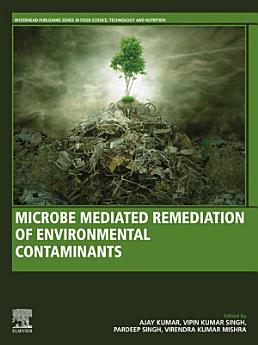Microbe Mediated Remediation of Environmental Contaminants
About this ebook
About the author
Dr. Ajay Kumar is currently working as an assistant professor at Amity Institute of Biotechnology, Amity University, Noida, India. Dr. Kumar completed his tenure (2018-2022) as a visiting scientist from Agriculture Research Organization, Volcani Center, Israel and doctoral research from Department of Botany, Institute of Science, Banaras Hindu University, Varanasi, India on the theme "Plant microbe interaction". In his research tenures, Dr. Kumar has published more than 235 scientific contributions in the form of research and review articles, books or book chapters with the leading International Journals or Publishers. He has wide area of research experience, especially in the field of Plant-Microbe Interactions, Microbial biocontrol, Postharvest management of fruits, Microbial endophytes related with the medicinal plants and cyanobacteria-pesticides interactions. Dr. Kumar actively engaged in editing book with the leading publisher like Elsevier, Springer, CRC Press, Willey and edited more than 48 books and currently serving as an Associate editor in Frontier in Microbiology, BMC Microbiology and special guest editor in Microorganisms or Plants MDPI, Journal.
Dr. Vipin Kumar Singh is currently working as CSIR Research Associate in the Department of Botany, Centre of Advanced Study, Banaras Hindu University, Varanasi, Uttar Pradesh, India. He obtained his Ph.D. degree in Botany from the Banaras Hindu University, Varanasi, Uttar Pradesh, India in the year 2015. He has worked in the UGC project entitled “Detoxification of arsenic contaminated groundwater by transgenic eco-friendly microbes. He has more than nine years of research experience in the area of groundwater hydro-geochemistry and bioremediation approaches to clean the contaminated groundwater sites. His area of interest includes the use of fast-growing plants and microbes to clean the contaminated soil and water system. Dr. Singh has published eight book chapters, twenty-one research articles in journals of national and international repute. He is a life time member of Indian Association of Hydrologists (IAH) and Association of Microbiologists of India (AMI). Currently, he is the member of editorial board in Indian Journal of Microbiology research and Water open access journal. So far, he has reviewed more than dozens of research articles and book chapters of international repute. He has actively participated in many national and international seminars, symposia, conferences and workshop related to the application of microbes in the management of contaminated sites.
Pardeep Singh is Professor and Head at the School of Advanced Chemical Sciences, Shoolini University, Solan, India. He is specialized in physical chemistry and heads a lab of research scholars who work on photocatalysis with the aim of generating new knowledge on graphene-based photocatalytic materials and processes to develop novel de-pollution treatments with enhanced efficiency and pilot-scale applicability. He is also exploring the generation of bio-waste material-based activated carbon for adsorption-based removal of aqueous phase pollutants.
Dr. Virendra Kumar Mishra currently working as Associate Professor at the Institute of Environment and Sustainable Development, Banaras Hindu University, Varanasi (India). He has done Ph.D. from Banaras Hindu University on water pollution in coal mines and treatment of coal miming effluent. He has expertise in analysis of water and wastewater, bioremediation and phytoremediation, environmental microbiology. After obtaining doctoral degree Dr. Mishra has worked at various levels at different National and international institution viz. Sejong University, Seoul, South Korea, IDAEA-CSIC, Barcelona Spain, IIT BHU. During the last fifteen years he has been an integral part in various research project related to wastewater treatment.




